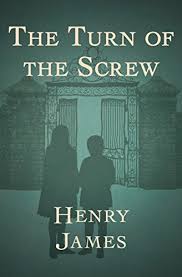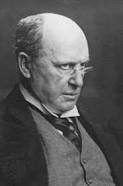The Turn of the Screw Page #2
The Turn of the Screw is an 1898 horror novella by Henry James that first appeared in serial format in Collier's Weekly magazine. In October 1898 it appeared in The Two Magics, a book published by Macmillan in New York City and Heinemann in London.
I knew the next day that a letter containing the key had, by the first post, gone off to his London apartments; but in spite of—or perhaps just on account of—the eventual diffusion of this knowledge we quite let him alone till after dinner, till such an hour of the evening, in fact, as might best accord with the kind of emotion on which our hopes were fixed. Then he became as communicative as we could desire and indeed gave us his best reason for being so. We had it from him again before the fire in the hall, as we had had our mild wonders of the previous night. It appeared that the narrative he had promised to read us really required for a proper intelligence a few words of prologue. Let me say here distinctly, to have done with it, that this narrative, from an exact transcript of my own made much later, is what I shall presently give. Poor Douglas, before his death—when it was in sight—committed to me the manuscript that reached him on the third of these days and that, on the same spot, with immense effect, he began to read to our hushed little circle on the night of the fourth. The departing ladies who had said they would stay didn’t, of course, thank heaven, stay: they departed, in consequence of arrangements made, in a rage of curiosity, as they professed, produced by the touches with which he had already worked us up. But that only made his little final auditory more compact and select, kept it, round the hearth, subject to a common thrill. The first of these touches conveyed that the written statement took up the tale at a point after it had, in a manner, begun. The fact to be in possession of was therefore that his old friend, the youngest of several daughters of a poor country parson, had, at the age of twenty, on taking service for the first time in the schoolroom, come up to London, in trepidation, to answer in person an advertisement that had already placed her in brief correspondence with the advertiser. This person proved, on her presenting herself, for judgment, at a house in Harley Street, that impressed her as vast and imposing—this prospective patron proved a gentleman, a bachelor in the prime of life, such a figure as had never risen, save in a dream or an old novel, before a fluttered, anxious girl out of a Hampshire vicarage. One could easily fix his type; it never, happily, dies out. He was handsome and bold and pleasant, off-hand and gay and kind. He struck her, inevitably, as gallant and splendid, but what took her most of all and gave her the courage she afterward showed was that he put the whole thing to her as a kind of favor, an obligation he should gratefully incur. She conceived him as rich, but as fearfully extravagant—saw him all in a glow of high fashion, of good looks, of expensive habits, of charming ways with women. He had for his own town residence a big house filled with the spoils of travel and the trophies of the chase; but it was to his country home, an old family place in Essex, that he wished her immediately to proceed. He had been left, by the death of their parents in India, guardian to a small nephew and a small niece, children of a younger, a military brother, whom he had lost two years before. These children were, by the strangest of chances for a man in his position—a lone man without the right sort of experience or a grain of patience—very heavily on his hands. It had all been a great worry and, on his own part doubtless, a series of blunders, but he immensely pitied the poor chicks and had done all he could; had in particular sent them down to his other house, the proper place for them being of course the country, and kept them there, from the first, with the best people he could find to look after them, parting even with his own servants to wait on them and going down himself, whenever he might, to see how they were doing. The awkward thing was that they had practically no other relations and that his own affairs took up all his time. He had put them in possession of Bly, which was healthy and secure, and had placed at the head of their little establishment—but below stairs only—an excellent woman, Mrs. Grose, whom he was sure his visitor would like and who had formerly been maid to his mother. She was now housekeeper and was also acting for the time as superintendent to the little girl, of whom, without children of her own, she was, by good luck, extremely fond. There were plenty of people to help, but of course the young lady who should go down as governess would be in supreme authority. She would also have, in holidays, to look after the small boy, who had been for a term at school—young as he was to be sent, but what else could be done?—and who, as the holidays were about to begin, would be back from one day to the other. There had been for the two children at first a young lady whom they had had the misfortune to lose. She had done for them quite beautifully—she was a most respectable person—till her death, the great awkwardness of which had, precisely, left no alternative but the school for little Miles. Mrs. Grose, since then, in the way of manners and things, had done as she could for Flora; and there were, further, a cook, a housemaid, a dairywoman, an old pony, an old groom, and an old gardener, all likewise thoroughly respectable. So far had Douglas presented his picture when someone put a question. “And what did the former governess die of?—of so much respectability?” Our friend’s answer was prompt. “That will come out. I don’t anticipate.” “Excuse me—I thought that was just what you are doing.” “In her successor’s place,” I suggested, “I should have wished to learn if the office brought with it—” “Necessary danger to life?” Douglas completed my thought. “She did wish to learn, and she did learn. You shall hear tomorrow what she learned. Meanwhile, of course, the prospect struck her as slightly grim. She was young, untried, nervous: it was a vision of serious duties and little company, of really great loneliness. She hesitated—took a couple of days to consult and consider. But the salary offered much exceeded her modest measure, and on a second interview she faced the music, she engaged.” And Douglas, with this, made a pause that, for the benefit of the company, moved me to throw in— “The moral of which was of course the seduction exercised by the splendid young man. She succumbed to it.” He got up and, as he had done the night before, went to the fire, gave a stir to a log with his foot, then stood a moment with his back to us. “She saw him only twice.” “Yes, but that’s just the beauty of her passion.” A little to my surprise, on this, Douglas turned round to me. “It was the beauty of it. There were others,” he went on, “who hadn’t succumbed. He told her frankly all his difficulty—that for several applicants the conditions had been prohibitive. They were, somehow, simply afraid. It sounded dull—it sounded strange; and all the more so because of his main condition.”
Translation
Translate and read this book in other languages:
Select another language:
- - Select -
- 简体中文 (Chinese - Simplified)
- 繁體中文 (Chinese - Traditional)
- Español (Spanish)
- Esperanto (Esperanto)
- 日本語 (Japanese)
- Português (Portuguese)
- Deutsch (German)
- العربية (Arabic)
- Français (French)
- Русский (Russian)
- ಕನ್ನಡ (Kannada)
- 한국어 (Korean)
- עברית (Hebrew)
- Gaeilge (Irish)
- Українська (Ukrainian)
- اردو (Urdu)
- Magyar (Hungarian)
- मानक हिन्दी (Hindi)
- Indonesia (Indonesian)
- Italiano (Italian)
- தமிழ் (Tamil)
- Türkçe (Turkish)
- తెలుగు (Telugu)
- ภาษาไทย (Thai)
- Tiếng Việt (Vietnamese)
- Čeština (Czech)
- Polski (Polish)
- Bahasa Indonesia (Indonesian)
- Românește (Romanian)
- Nederlands (Dutch)
- Ελληνικά (Greek)
- Latinum (Latin)
- Svenska (Swedish)
- Dansk (Danish)
- Suomi (Finnish)
- فارسی (Persian)
- ייִדיש (Yiddish)
- հայերեն (Armenian)
- Norsk (Norwegian)
- English (English)
Citation
Use the citation below to add this book to your bibliography:
Style:MLAChicagoAPA
"The Turn of the Screw Books." Literature.com. STANDS4 LLC, 2025. Web. 21 Jan. 2025. <https://www.literature.com/book/the_turn_of_the_screw_330>.




Discuss this The Turn of the Screw book with the community:
Report Comment
We're doing our best to make sure our content is useful, accurate and safe.
If by any chance you spot an inappropriate comment while navigating through our website please use this form to let us know, and we'll take care of it shortly.
Attachment
You need to be logged in to favorite.
Log In